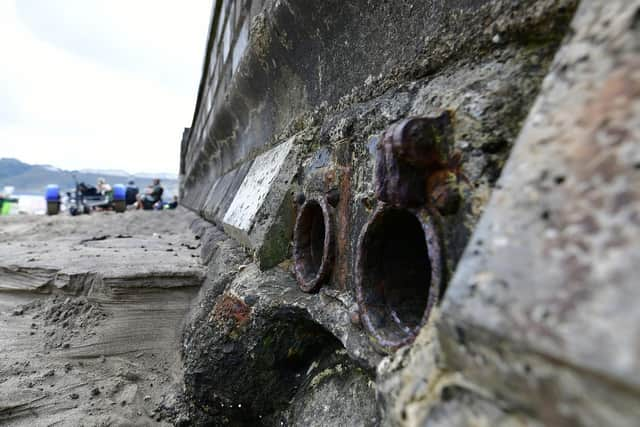Sewage spilled into Yorkshire's waterways for 1.5 million hours over last six years, figures show
Yorkshire Water recorded 169,576 spillage incidents between 2016 and 2021, which equates to one incident every 18 minutes, according to figures obtained by The Labour Party shows.
Louise Haigh, MP for Sheffield Heeley said: “It’s appalling that Yorkshire Water continue to dump sewage onto our beaches and waters destroying the natural environment as well as causing a health hazard to the millions of visitors to these sites each year.
Advertisement
Hide AdAdvertisement
Hide Ad“The country is facing a dirty water emergency and this Tory government has sat back and enabled private water companies to treat our waterways as dumping grounds. Labour will end this disgraceful practice, ensure enforcement of unlimited fines for water companies and toughen up regulations that currently allow the system to be abused.”


Yorkshire Water, which introduced a hosepipe ban for its 5.4m customers following months of dry weather, has also been heavily criticised for its response to leaks. It lost 283.1m litres per day in 2021/22.
The Environment Agency said last month Yorkshire Water’s environmental performance requires “significant improvement”, as it recorded 74 pollution incidents last year and five were deemed to be serious.
Analysis by the Liberal Democrats also shows sewage spilled into designated bathing sites for at least 160,000 hours in total last year during 953 storm overflow incidents. There were 22 incidents at bathing spots Yorkshire, the lowest number recorded by a utilities company.
Advertisement
Hide AdAdvertisement
Hide AdHowever, across the country almost a quarter of these sites (24.32 per cent) have faulty sewage monitors, or no monitors at all.
A No 10 spokeswoman said: "We have been clear that the failure of water companies to adequately reduce sewage discharges is completely unacceptable. They have a duty to put their customers before shareholders and we would expect them to take urgent action or face fines."
It comes after the Environment Agency revealed the number of serious incidents recorded by all water companies increased to 62 last year, the highest total since 2013. Five were prosecuted for breaching environmental rules and ordered to pay more than £137m in fines.
Speaking last month, Chair Emma Howard Boyd said: “Company directors let this occur and it is simply unacceptable. Over the years the public have seen water company executives and investors rewarded handsomely while the environment pays the price.”
Advertisement
Hide AdAdvertisement
Hide AdYorkshire Water’s operating profit rose to £242.3m in 2021/22, up from £241.4m the previous year, and the company’s senior management received £3.298m in bonuses. It paid out £52.6m in dividends, but said the money went to parent company Kelda Holdings Limited to cover operating costs, not to private shareholders.
According to the report, chief executive Nicola Shaw will be paid a base salary of £574,000 and chief financial officer Chris John will receive £317,764. Outgoing chief executive Liz Barber will be paid £442,909 this year.
Sir Robert Goodwill, chair of the environment, food and rural affairs committee, said water companies have to allow water containing sewage to spill out, when heavy rain causes overflows, to ensure it does not “bubble out of people’s toilets and run down the streets”.
That is because many homes across the country have one pipe to catch rainwater and sewage, he said, but replacing this outdated system is “not practical”.
Advertisement
Hide AdAdvertisement
Hide AdHe said the Government is planning to introduce tougher measures on sewage pollution in the Environment Bill, but the regulator Ofwat should also allow companies to increase bills, so they invest in new facilities to hold excess water during storms.
“Of course water companies also need to do more,” the Tory MP added. “The profits they make, the salaries paid to their chief executives and the rates of interest they pay to their institutional owners, who are often in places like Australia and Canada, are also a cause for concern.”
Ofwat said investment in the industry has roughly doubled since privatisation in 1989, and companies spent around £6bn a year on upgrading their infrastructure between 2015 and 2020.
But they also paid out £57bn in dividends to shareholders of parent companies between 1991 and 2019.
Advertisement
Hide AdAdvertisement
Hide AdA Yorkshire Water spokesman said: “We completely understand the increased public interest in river quality in our region and nationally. We know that our storm overflows operate more often than our customers, or we, would like and we’re working hard to make improvements across the region.
“We’re investing £790m to improve rivers across the region, including £137m by 2025 to enhance, investigate and increase monitoring on storm overflows.
“Now spill targets have been clarified, meeting these targets will be a core part of our next five-year plan for Yorkshire and we will look to go beyond the regulatory measures with our customers' and regulators' support.
“Increased monitoring of storm overflows over the last five years has played a part in the increase in discharges reported. 97 per cent of our permitted storm overflows have monitoring equipment installed, and the rest will be monitored in the very near future.”